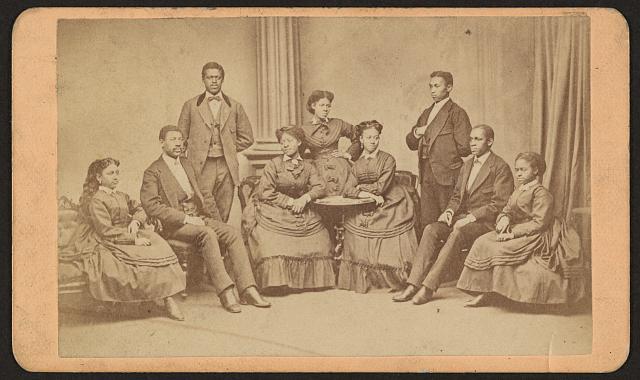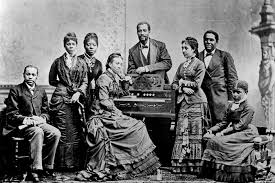By Claire Jackson
Quartets are a capella ensembles made up of four voices that perform spirituals in close harmony. The parts are: a low bass singer, a baritone soloist, a second tenor, and a higher pitched first tenor. The name “Jubilee Quartet” derives from the Fisk Jubilee Singers, a group from Fisk University. The group was formed during the late nineteenth and early twentieth century. To clarify, the Fisk Jubilee singers were not a quartet, but were inspiration for future quartets.


Video Above: The Jubilee Four. They began their career as the Jubalaires early on and then re-emerged as the Jubilee Four made up of Willie Johnson, Jimmy Adams, Theodore Brooks, and George McFadden. Their renditions and performances of songs have very strong gospel roots and maintains the formula of a traditional Quartet and each singers’ vocal parts.
Video Above: Swing Low, Sweet Chariot performed by the Fisk University Jubilee Quartet in 1909. The singers are John Wesley Work II, Noah Walker Ryder, James Andrew Myers, and Alfred Garfield King. This is a very popular Negro Spiritual Song, and reflects the traditions of Jubilee Quartets and the strong ties to Spirituals and the ancestral connection the music brings.
Video Above: The Golden Gate Quartet. Members include Paul Brembly, Frank Davis, Thierry François, and Timothy Riley. This group gained great success performing Spirituals and other songs of that nature, even gaining the attention and ability to perform at the White House. First Lady Eleanor Roosevelt’s invitation for them to perform at the 1941 inauguration made history as well.
Quartets grew from being community based singing groups in the African American community in Church services and social groups to commercial broadcasting and television performances. This grew a following of not only Black listeners but also white, which brought the traditions and experiences of the Black community to light even further through music. By the 1930s, the popularization of quartets was very prominent in live radio broadcasting, and some groups even began to tour.

In conclusion, the African American Quartet and its various forms, especially Jubilee, catered to the already created Negro Spirituals and hymns and was the perfect avenue for them to be performed. It became a section of gospel music in its own, and grew into something iconic and notable like it is today. Nowadays, Quartets still exist in the African American Spiritual tradition, and will continue to be formed as time goes on.

